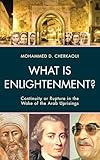What is enlightenment? : continuity or rupture in the wake of the Arab uprisings / Mohammed D. Cherkaoui.
Material type: TextPublisher: Lanham : Lexington Books, [2016]Description: xv, 387 pages ; 24 cmContent type: text Media type: unmediated Carrier type: volumeISBN: 9780739193679 (cloth : alk. paper); 0739193678 (cloth : alk. paper)Subject(s): Arab Spring, 2010- | Arab countries -- Politics and government -- 21st century | Enlightenment -- Arab countries | Arab Spring (2010-) | Enlightenment | Politics and government | Arab countries | 2000-2099Additional physical formats: Online version:: What is enlightenment?DDC classification: 321.80956 LOC classification: JQ1850.A91 | C44 2016
TextPublisher: Lanham : Lexington Books, [2016]Description: xv, 387 pages ; 24 cmContent type: text Media type: unmediated Carrier type: volumeISBN: 9780739193679 (cloth : alk. paper); 0739193678 (cloth : alk. paper)Subject(s): Arab Spring, 2010- | Arab countries -- Politics and government -- 21st century | Enlightenment -- Arab countries | Arab Spring (2010-) | Enlightenment | Politics and government | Arab countries | 2000-2099Additional physical formats: Online version:: What is enlightenment?DDC classification: 321.80956 LOC classification: JQ1850.A91 | C44 2016| Item type | Current library | Call number | Copy number | Status | Notes | Date due | Barcode |
|---|---|---|---|---|---|---|---|
 Books
Books
|
Female Library | JQ1850.A91 .C44 2016 (Browse shelf (Opens below)) | 1 | Available | STACKS | 51952000337416 | |
 Books
Books
|
Main Library | JQ1850.A91 .C44 2016 (Browse shelf (Opens below)) | 1 | Checked out | STACKS | 01/26/2022 | 51952000337409 |
Browsing Main Library shelves Close shelf browser

|

|

|

|

|

|

|
||
| JQ1841 .A71 S24 2012 الدور التنظيمي والرقابي لمجلس الشورى السعودي / | JQ1844 .A58 R84 2010 The political culture of leadership in the United Arab Emirates / | JQ1850.A91 .C377 2013 Writing revolution : the voices from Tunis to Damascus / | JQ1850.A91 .C44 2016 What is enlightenment? : continuity or rupture in the wake of the Arab uprisings / | JQ1850.A91 .G37 2015 The Arab uprisings : what everyone needs to know / | JQ1850.A91 .K72 2016 The naked blogger of Cairo : creative insurgency in the Arab world / | JQ1850.A91 .S2365 2017 The decline of nation-states after the Arab Spring : the rise of communitocracy / |
Includes bibliographical references (pages 353-377) and index.
Preface: 1. the Arab uprisings: the freedom-to question / Mohammed D. Cherkaoui -- Part I: Experimenting with social change: 2. Immanuel Kant in Tahrir Square / Mohammed D. Cherkaoui -- 3. Newtonian Force of the Arab Uprisings / Mohammed D. Cherkaoui and Hani Albasoos -- 4. The Battle for Syria: The Bloody Non-violent Protest / Mohammed D. Cherkaoui and Radwan Ziadeh -- Part II: Debating Reason and Modernity: 5. Revolutionary Mediatization and the New Arab Civil Sphere / Mohammed D. Cherkaoui -- 6. The Google-Earth Democracy: The Two-Legitimacy Conflict in Egypt / Mohammed D. Cherkaoui -- Part III: Connecting the Arab Public Sphere to the World: 7. How Do We Know What We "Know" about Politics and Reform in the Arab World? / Brian R. Calfano -- 8. Crafting Democracy: Political Learning as a Precondition for Sustainable Development in the Maghreb / John P. Entelis -- 9. Religion, Youth and Women in the Arab Region: Challenging Global Institutions and Politics of Development / Azza Karam -- Part IV: Predicting an Arab Age of Enlightenment: 10. Democracy against Social Reform: the Arab 'Spring' Faces its Demons / Albena Azmanova -- 11. Organizing Principles for the Arab Enlightenment: Philosophical Reflections on the History of Power / Solon J. Simmons -- 12. The 'Dialectic of Enlightenment' and the New Arab Awakening / Richard E. Rubenstein -- 13. An Arab Axial Age? / Mohammed D. Cherkaoui -- 14. Conclusion: Islamocracy or Demoslamic Politics? The New Dialectic / Mohammed D. Cherkaoui -- Bibliography.
Political sociology has struggled with predicting the next turn of transformation in the Middle Eastern and North African countries after the 2011 Uprisings. Arab activists did not articulate any modalities of their desired system, although their slogans gestured to a fully democratic society. These unguided Uprisings showcase an open-ended freedom-to question after Arabs underwent their freedom-from struggle from authoritarianism. The new conflicts in Egypl, Syria, Yemen, and Libya have fragmented shar'iya (legitimacy) into distinct conceptualizations: "revolutionary legitimacy," "electoral legitimacy," "legitimacy of the street," and "consensual legitimacy." This volume examines whether the Uprisings sought to introduce a replica of the European Enlightenment or rather stimulate an Arab/Islamic awakening with its own cultural specificity and political philosophy. By placing Immanuel Kant in Tahrir Square, this book adopts a comparative analysis of two enlightenment projects: one Arab, still under construction, with possible progression toward modernity or regression toward neo-authoritarianism, and one European, shaped by the past two centuries. Mohammed D. Cherkaoui and the contributing authors use a hybrid theoretical framework drawing on three tanwiri (enlightenment) philosophers from different eras: Ibn Rushd, known in the west as Averroes (the twelfth century), Immanuel Kant (the eighteenth century), and Mohamed Abed Al-Jabri (the twentieth century). The authors propose a few projections about the outcome of the competition between an Islamocracy vision, and what Cherkaoui terms as a Demoslamic vision, a vision that implies the Islamist movement's flexibility to reconcile its religious absolutism with the prerequisites of liberal democracy. This book also traces the patterns of change which point to a possible Arab Axial Age. It ends with the trials of modernity and tradition in Tunisia and an imaginary speech Kant would deliver at the Tunisian Parliament after those vibrant debates of the new constitution in 2014.
1 2

There are no comments on this title.